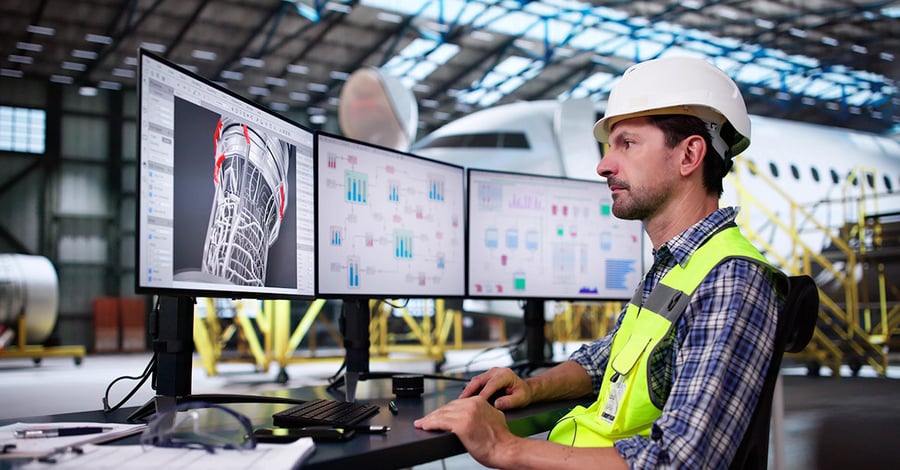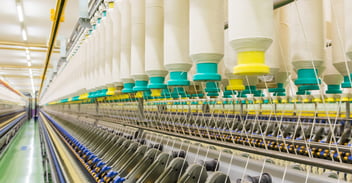

The aerospace component manufacturers industry has evolved rapidly, driven by technological advancements and stringent operational requirements. With these advancements come complex challenges in inventory management, compliance, quality assurance, and production efficiency. Industry-specific ERP systems emerge as essential tools, addressing these challenges and empowering manufacturers to thrive in this dynamic sector.
Challenges in the Aerospace Component Manufacturers Industry
Inventory Complexity:
Aerospace component production involves a wide array of components, from motors and propellers to PCBs and advanced materials like carbon fiber. Inventory management presents a significant hurdle. This sector deals with a diverse range of components, from high-tech electronics and specialized materials to delicate parts with stringent storage requirements. Maintaining accurate inventory records, tracking shelf life, and ensuring timely procurement of critical components are crucial for smooth operations.
Compliance and Security:
The aerospace component manufacturers sector operates under strict regulatory frameworks, particularly defense-related products, with stringent safety, quality, and compliance requirements. This regulatory compliance adds another layer of complexity as it demands meticulous record-keeping, accurate documentation, and robust audit trails.
Data Security and Confidentiality:
Manufacturers must ensure air-gapped networks, secure data handling, and compliance with government norms for indigenous production. Maintaining data confidentiality is crucial, especially when dealing with defense-related applications and critical infrastructure.
Production Variability:
Unlike mass production, drone assembly often requires a project-specific approach, leading to fluctuating timelines and demand for real-time coordination across teams. Product variability often arises due to customization demands from diverse clients. Each project often requires different designs, materials, and specifications. For example, a surveillance drone may need enhanced sensors, while a delivery drone prioritizes payload capacity. This variability complicates production planning, making it challenging to maintain consistency and efficiency.
Quality Control:
The emphasis on precision and performance means that QC processes, especially for sophisticated components like PCBs, can often surpass production timelines. Besides, ensuring consistent quality across variable products is difficult. Manual inspections are often insufficient for detecting micro-defects in critical components like carbon fiber sheets. For instance, an undetected flaw in a drone’s propeller can lead to performance failure. Automated QC systems are essential to ensure precision and reliability.
Supply Chain Complexity:
Fragmented supply chains, often involving global sourcing, increase the risk of delays and disruptions. Ensuring the quality and authenticity of components from various suppliers requires meticulous tracking and verification.
Attending Customer Calls:
In the aerospace component manufacturers industry, particularly for drone manufacturers and AAD parts suppliers, attending customer calls is often inefficient due to a lack of streamlined processes. Many organizations rely on manual systems to log and track customer interactions, leading to delays in addressing urgent issues. For instance, when a drone malfunctions during field operations, the call may not be documented promptly, causing delays in sending the necessary parts or technical team. This inefficiency often results in prolonged downtimes, missed SLAs (Service Level Agreements), and dissatisfaction among defense and commercial clients, who demand quick resolutions due to the high stakes involved.
Lack of Digital Purchase Order System:
The current purchase order systems in the aerospace component manufacturers sector are often rudimentary, lacking digital integration and automation. This results in challenges such as delays in procurement, mismatches in order specifications, and a lack of visibility into supply chain activities. For example, when sourcing high-value components like carbon fiber or specialized sensors, immediate procurement is crucial. Yet, manual systems lead to slow approvals and inadequate tracking of vendor performance. The industry’s reliance on ticketing systems or ad hoc communication further exacerbates inefficiencies, making it difficult to meet urgent production deadlines or R&D demands.
Manual Processes in Finance Department:
Financial processes in the aerospace component manufacturers industry often remain manual and theoretical, particularly for newer sectors like drones. Many organizations calculate costs and expenses based on estimations rather than actual data from shop floors or inventory records. For instance, companies struggle to accurately allocate costs for R&D activities, capital goods procurement, or duty payments for imported parts. This lack of granularity leads to discrepancies in financial reporting and decision-making. Additionally, delays in processing duties and complying with complex government regulations can result in penalties or disrupted operations, further stressing financial systems.
The Role of ERP Systems in Addressing Industry Needs
Streamlined Inventory Management:
Industry-specific ERP systems automate and optimize inventory tracking, ensuring real-time visibility and efficient management of high-value, sensitive components. They can track critical parameters such as shelf life, temperature, and humidity for sensitive components. For instance, ERP systems can integrate with smart storage solutions to monitor and maintain environmental conditions, ensuring that sensitive materials remain usable.
Another scenario would involve a drone manufacturer managing thousands of small, high-value components stored in automated warehouses. ERP systems can enable real-time tracking, where each component's location, usage history, and remaining shelf life are accessible. This reduces waste, eliminates mismanagement, and ensures compliance with regulatory storage requirements.
Enhanced Production Planning:
ERP solutions align production schedules with fluctuating demand, improving assembly timelines and resource allocation. Unlike industries with standardized assembly lines, drone manufacturing often involves bespoke projects with fluctuating demand. For example, an aerospace component manufacturer receiving an order for 100 surveillance drones with payload capabilities must align production resources efficiently. ERP systems facilitate dynamic planning, from ensuring the availability of key components to scheduling assembly tasks. A manufacturer can also avoid production delays by using an ERP-integrated dashboard to balance workloads across teams, ensuring the timely completion of critical projects without overburdening workers.
Integrated Quality Assurance:
Precision is critical in aviation, particularly for components like PCBs used in drones’ navigation systems. Industry-specific ERP systems automate QC processes with advanced tools like AI-driven defect detection and traceability, ensuring every component meets stringent aviation standards. Real-time data analytics further enhance the ability to predict and rectify defects before they escalate. For example, a drone manufacturer can utilize ERP-integrated AI-driven quality checks to detect minor defects in electronic boards. These automated systems flag inconsistencies invisible to the human eye, significantly reducing the risk of faulty assemblies. Additionally, ERP tools provide traceability, allowing engineers to identify and rectify defects’ origins, whether in raw materials or production processes. This ensures compliance with aviation standards while reducing rework costs.
Regulatory Compliance:
Industry-specific ERP systems can help organizations maintain compliance with industry regulations and standards. Aerospace component manufacturers, especially those producing defense-grade drones, must meet stringent regulatory requirements. For instance, an Indian manufacturer producing drones for military use relies on ERP software to comply with "Make in India" policies. The system automates documentation for customs clearance, duty-free imports, and export permissions, ensuring full compliance with government-mandated processes. ERP also simplifies reporting for MRO (Maintenance, Repair, and Overhaul) operations, enabling manufacturers to maintain licenses and readiness for audits.
Data Security:
Air-gapped ERP systems ensure secure operations, vital for defense manufacturers. These systems enable internal and external coordination while safeguarding sensitive information. This apart, robust security features within ERP systems, such as access controls, encryption, and data backups, also ensure the protection of sensitive information. For example, a drone manufacturer serving military clients uses an industry-specific ERP system designed for air-gapped environments. This ensures no data leaks to unauthorized entities. Data about a newly designed drone’s specifications and production details remains restricted to specific users, with multi-layered authentication and encryption provided by the ERP. This level of security fosters trust among clients and aligns with stringent defense industry norms. This apart, ERP systems can also help protect location data of MRO sites while offering access to only authorized teams.
Streamlined Supply Chain Management:
ERP systems facilitate better communication and collaboration with suppliers, enabling efficient procurement and timely materials delivery. They can track orders, monitor shipments, and ensure that quality standards are met at every stage of the supply chain. Consider a drone manufacturer sourcing high-grade carbon fiber and precision electronic components from international suppliers. With an industry-specific ERP system in place, the company can track the shipment of carbon fiber from a supplier in Europe and electronic sensors from an Asian vendor in real time. The ERP system provides automated alerts about potential delays in customs clearance or transportation. Also, when importing high-value items for defense drones, the ERP tracks customs duties and generates reports for audit purposes, ensuring compliance with defense industry regulations.
Cloud ERP Solutions for Scalability and Real-Time Decision Making
As aerospace component manufacturers scale operations and diversify product portfolios, legacy on-premise systems often fall short in delivering the flexibility and agility needed for modern manufacturing environments. This is where cloud ERP solutions play a transformative role. Designed to support real-time operations and global collaboration, cloud-based ERP systems offer unmatched scalability, faster deployment, and centralized control — all essential for high-growth sectors like UAV and aerospace part manufacturing.
Scalability Across Multi-Site Operations:
Aerospace manufacturers often operate across multiple geographies or maintain several production units, R&D centers, and vendor touchpoints. With a robust cloud ERP solution, teams can coordinate effortlessly in real-time, whether tracking components at a remote assembly unit or reviewing QC metrics at headquarters. Unlike traditional setups, cloud ERP systems allow for on-demand resource allocation and module integration, supporting the rapid growth of drone and defense tech startups.
Data-Driven Decision Making:
Access to real-time analytics is no longer a luxury but a necessity. A modern ERP system powered by the cloud ensures that executives, plant heads, and supply chain teams access the same, updated data across devices. For example, when a defense drone batch fails a QC inspection at one location, alerts and data insights are instantly visible to R&D and procurement teams through the ERP dashboard. This cross-functional visibility leads to faster decisions, minimizes bottlenecks, and boosts responsiveness.
Disaster Recovery and Business Continuity:
With increased risks related to cybersecurity and geopolitical tensions, cloud ERP solutions provide built-in disaster recovery features. Data is stored in secured environments with automated backups, ensuring operational continuity even during local disruptions.
For aerospace manufacturers striving to remain agile, compliant, and efficient, embracing cloud-based ERP solutions is key to future readiness and innovation.
Conclusion
In the new-age aerospace component manufacturers industry, precision, compliance, and agility are paramount. ERP systems revolutionize the aerospace component manufacturers industry by addressing critical challenges like inventory management, compliance, and quality assurance. With aviation-specific functionalities, these systems empower drone and aerospace component manufacturers to deliver precision-engineered products and ensure regulatory compliance and operational efficiency while paving the way for innovation. For businesses seeking to thrive in this high-stakes domain, adopting ERP technology is not just a strategic advantage but a necessity. While Ramco offers this industry-specific ERP system, it is the first Asian ERP Provider from India. Manufacturers often prefer to have other Indian service providers, and the Indian government also promotes Indian-origin companies as part of their ‘Make India’ campaign


